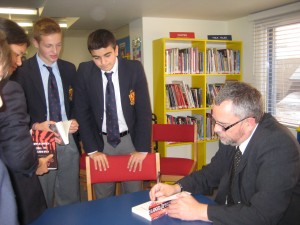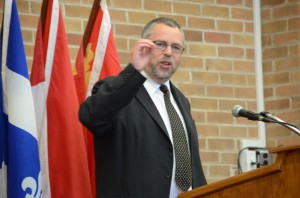 On October 22 and 23, LCC was lucky enough to have a special guest at the school, Alan Gibbons. (See photos) He was the author of the summer reading book, Caught in the Crossfire, an emotional tale about racism against British Muslims in England, filled with love, action, and the tragedies of hatred. For most students, the first time they saw the author was at Tuesday’s assembly. The assembly started off with a speech by our headmaster, about the importance of reading, of critical reading, in an information age (and misinformation age, as he pointed out). Mr. Moore also spoke about the success of the LCC reads committee, and the importance of reading bringing people together.
On October 22 and 23, LCC was lucky enough to have a special guest at the school, Alan Gibbons. (See photos) He was the author of the summer reading book, Caught in the Crossfire, an emotional tale about racism against British Muslims in England, filled with love, action, and the tragedies of hatred. For most students, the first time they saw the author was at Tuesday’s assembly. The assembly started off with a speech by our headmaster, about the importance of reading, of critical reading, in an information age (and misinformation age, as he pointed out). Mr. Moore also spoke about the success of the LCC reads committee, and the importance of reading bringing people together.
When Mr. Gibbons got up to speak, there was a silence in the room. Of course, the students knew his books, and that he was quite an accomplished author, but wondered what he would talk to them about. He spoke quickly, and said a few words in French, before delving into his story, and the importance of overcoming hatred and intolerance. His humour soon got the entire assembly into his presentation. He was from ‘the good part of England’, and had spent many of his younger years abroad the hippie fad train, traveling around Europe and seeing the world. When he met his current wife, however, it was time to settle down. He became a teacher, and divided his time between writing and spending time with his students.
One day, however, a secretary rushed to deliver some news. “School secretaries, you know how they just glide around the school? Well she was running! I knew something was up at that moment.” He had been nominated for the Blue Peter award, one of the most recognized literary awards in Britain! It was a great shock to him, being a somewhat unknown, and little successful author at the time. He decided that he would win the award, no matter whom he was up against. Then, he found out who his competitors were. He was up against some of the most famous authors in England, including Harry Potter author, JK Rowling. “I was just looking at these other authors and thinking ‘I’m not worthy’!” To his surprise, however, he won the award!
And so started his career as an author – his full-time career. For him, writing was the way that one could visit places, hundreds of years after they have been destroyed. It was the only way you could live a life that wasn’t yours. Buildings are burned down, eras are ended, but writing survives. Storytelling was passing values and morals down from generation to generation.
This became his goal, spreading values to all of his readers. He spoke about how this was important, not only in Britain, but in Quebec as well, where our Premier, Pauline Marois, is attempting to remove the religious freedoms of public sector workers. Now, more than ever, is it important to raise our voices against hatred and discrimination.
His speech most certainly impacted every person in the audience, and soon a line was forming to ask questions, many of which were about his personal quest to spread tolerance.
After, the LCC Reads committee was fortunate enough to meet with him, get their books signed, and discuss Dr. Who over a cup of tea and a piece of cake. Throughout his visit, he went to various English classes, prompting the students to write stories, and talking to the class about his visit.
Though his visit is now over, we’ll all keep what he said with us forever. We are truly fortunate to have had such an amazing guest author, for a full two days. – Elizabeth O’Meara ’15



